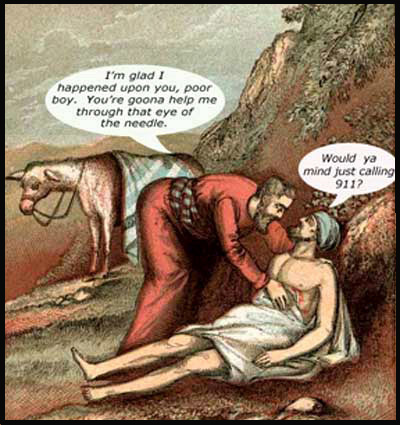
The Good Samaritan ©2004 UrbisMedia
Whatever happened to all that stuff that Jesus used to utter about “blessed are the poor in spirit” (Matthew 5:1-3 for you literalists)? To heck with “spirit,” whatever he meant by that (check out some Christian websites for some stretchy interpretations), what about just being poor? Now, Jesus did seem to care for the materially poor as well, healing lepers and others who could not get adequate health care (whatever that was) in those times, telling parables about good Samaritans. He hung out with working class fishermen and even, the Church would like us to believe, a prostitute. And, he also said it would be easier for a camel to pass through the eye of a needle than for a rich man to get into heaven.
But this area of Christian “thought” is full of conundrums. Who the hell wants to be poor other than some deranged mendicant betting on his inheritance of the kingdom of heaven. Poverty is responsible for most wars, crimes, violence, family dissolution, sickness, depression, death – do I have to go on?—OK, then, and people without SUVs and plasma screen TVs, and other human suffering. What was Jesus thinking, anyway? Well, it’s one of those goofey Christian notions perhaps best put by: if you don’t have a robbed and beaten guy in the ditch, then how can the Samaritan pick his sorry butt out of the ditch and become a “good” Samaritan? What kind of a world is that? Better not to have the guy in the ditch in the first place; why does he have to get beat up some Samaritan can get his Christian “merit”?
It’s the same thing with sin; no sin means no guilt, fear of hell, and such, and therefore no redemption (“The Redeemer” would be out of a job), no expensive churches, no tithing, well you get it. And so with the poor. We need them so that we can trickle a few coins in their direction—but not enough to get them out of poverty lest we upset the Samaritan ethos. [When I was in Catholic elementary school the nuns used to give us these little mite boxes to fill up with our candy money that presumably would be used to “adopt” and rescue the souls of “pagan babies” somewhere in the South Pacific. I must have at least half-dozen “Christian” babies—maybe babes by now. And I earned a lot of what the nuns called “grace.”] But I digress. The whole point is this: if you don’t have poor, sick and sinful people, the rich and better off don’t have a basis for earning their way into heaven through the eye of a needle.
Now don’t get me wrong here. (Mom, that means you, too.) The last thing I would want to do is throw good old Christian charity out with the dirty bathwater of hypocrisy. My question is this: is this supposed to be some sort of what economists call, “equilibrium” situation? What happens if we eliminate poverty, sickness, and sin? There, will, of course, always be some of those things; but remember, they are good for the religion “business” (you can’t prayer shawls, holy pictures, and indulgences to people who don’t need them) and seemingly indispensable for personal redemption.
All of this might be something for your next Bible study class or when your having a beer with Billy Graham. But this is, we are told, a “Christian country,” where church pretty much has its hands in the drawers of state, so such matters as what to do about poverty, sickness, and sinfulness blur from the sacred to the secular, or vice versa, more than ever. Just howChristian is that state going to be? How beneficent should a Christian state be? How merciful? How forgiving? How worthy will the poor, sick and sinful be of Christian state Samaritanism? Will the would-be Samaritan now say: “Hey, don’t bug me, I gave on April 15.” Should the unfortunate receive the ministrations of their holy government on the basis of secular rights , or sacred rectitude. Shall the poor be regarded as unworthy laggards, the sick suffering the wages of their self abuse, and the sinful needing to repent from their “chosen” ways. Now there’s an “out”: you are in the mess you are in because you deserve to be that way. In other words, in a “Christian state” will the sick and the poor have to be forgiven to receive the charity of their government?
Oh Lord, if you are there, if there was ever a good reason for the separation of church and state it’s that church is probably capable of a helluva lot more un-Christ-like behavior than government. Given a choice between rights and righteousness , I’ll take my rights.
___________________________________
©2004, James A. Clapp (UrbisMedia Ltd. Pub. 12.27.2004)
